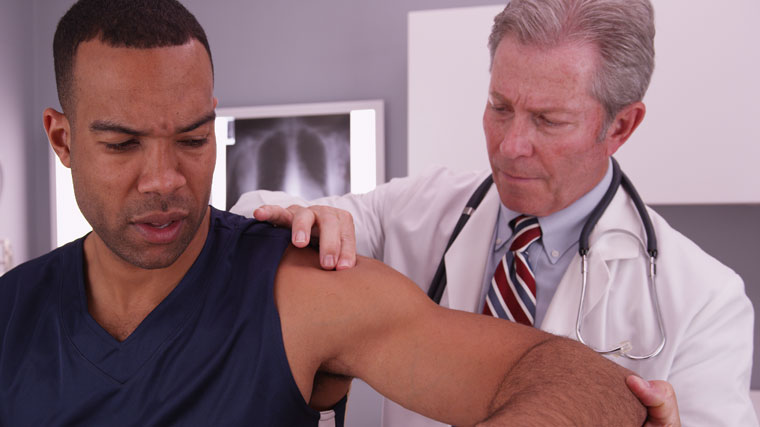Rotator Cuff Injuries Painful, Common

Answer a few questions and we'll provide you with a list of primary care providers that best fit your needs.
Unfortunately, rotator cuff issues are common and include tendinitis and other injuries, such as tears.
Located in your shoulder area, the rotator cuff is made up of muscles and tendons, and it helps your shoulder move and stay stable.
Many rotator cuff injuries are caused by aging, which leads to the tendons wearing down and eventually tearing. Injuries can also occur in falls. “Rotator cuff injuries occur on a spectrum,” explains Jordan Grilliot, DO, sports medicine physician and orthopedic surgeon. “There can be injuries where only a part of the rotator cuff tendon is injured, and the rest of the tendon is still attached to the bone. In more severe injuries, the whole rotator cuff tendon can tear off the bone. These severe injuries can lead to loss of function and significant weakness in your shoulder, especially with overhead activities.”
Frequent, repetitive use can also cause tendon wear and tear. Repetitive overhead arm motion caused by sports activity or while at work can damage the rotator cuff.
Rotator cuff tears are almost always painful.
Symptoms of rotator cuff injuries can include:
- For a chronic tear. Pain, weakness, stiffness, and loss of motion slowly get worse over time. Symptoms might not be noticeable at first because they start off minor. Worse pain at night than during the day. Symptoms get much worse unless treated with medicines, rest, and/or exercise.
- For a sudden tear. Intense pain after a sudden tear from a fall or injury. Immediate weakness in the shoulder and arm after the injury. Snapping feeling when moving the arm. Worse pain at night than during the day. Symptoms get much worse unless treated with medicines, rest, and/or exercise.
- For tendinitis. Mild pain with overhead reaching and lifting your arm to the side. Pain more likely in the front of the shoulder and side of the arm. Pain stops before the elbow. Without healing, it can hurt when lying on the injured shoulder. Weakness or loss of motion when raising the arm above the head. Stiffness in the shoulder.
“In rotator cuff tendinitis, there is inflammation and swelling in the tendon that can cause pain,” says Dr. Grilliot. “The structure of the rotator cuff is intact in rotator cuff tendinitis. In rotator cuff injuries, there is often damage to the structure of the rotator cuff where it attaches to the bones of your shoulder.”
Treatment for Rotator Cuff Injuries
If you believe you have a rotator cuff injury, it’s important to visit your doctor for guidance on what steps to take for treatment.
“Many rotator cuff problems can initially be treated without surgery,” says Dr. Grilliot.
For tendinitis, treatment may include:
- Activity modification to avoid pain or worsening pain
- Ice packs for 20 minutes at a time, 3 or 4 times a day
- Injection of medicine (corticosteroid) into the shoulder to help pain and swelling
- Physical therapy to stretch and strengthen shoulder muscles
- Medication, such as ibuprofen or naproxen, to ease the swelling and pain
“In some cases, surgery may be recommended early to repair your rotator cuff injury—that is, if you have a severe or significant injury or new weakness in your rotator cuff. Generally, surgery is only recommended if non-surgical treatments have proven ineffective and may improve your outcome and allow you to return to your normal activities more quickly.”
“Recovery following surgery can be lengthy,” explains Dr. Grilliot. “You will likely be placed in a sling afterwards. Often, it can take 12 weeks or more before you begin building strength in your repaired rotator cuff, as good healing of the torn tendon to the bones in your shoulder can take 12-14 weeks.”
Preventing Rotator Cuff Injuries
One of the best ways to avoid a new or follow-up rotator cuff injury is to avoid repeated overhead movements with your arm. Your doctor can also recommend exercises you can do at home to help strengthen your shoulder and arm muscles to prevent rotator cuff issues. These may involve light resistance bands or light weights as well as some light stretching.
Answer a few questions and we'll provide you with a list of primary care providers that best fit your needs.
Source: National Institutes of Health; Jordan Grilliot, DO, Premier Orthopedics





